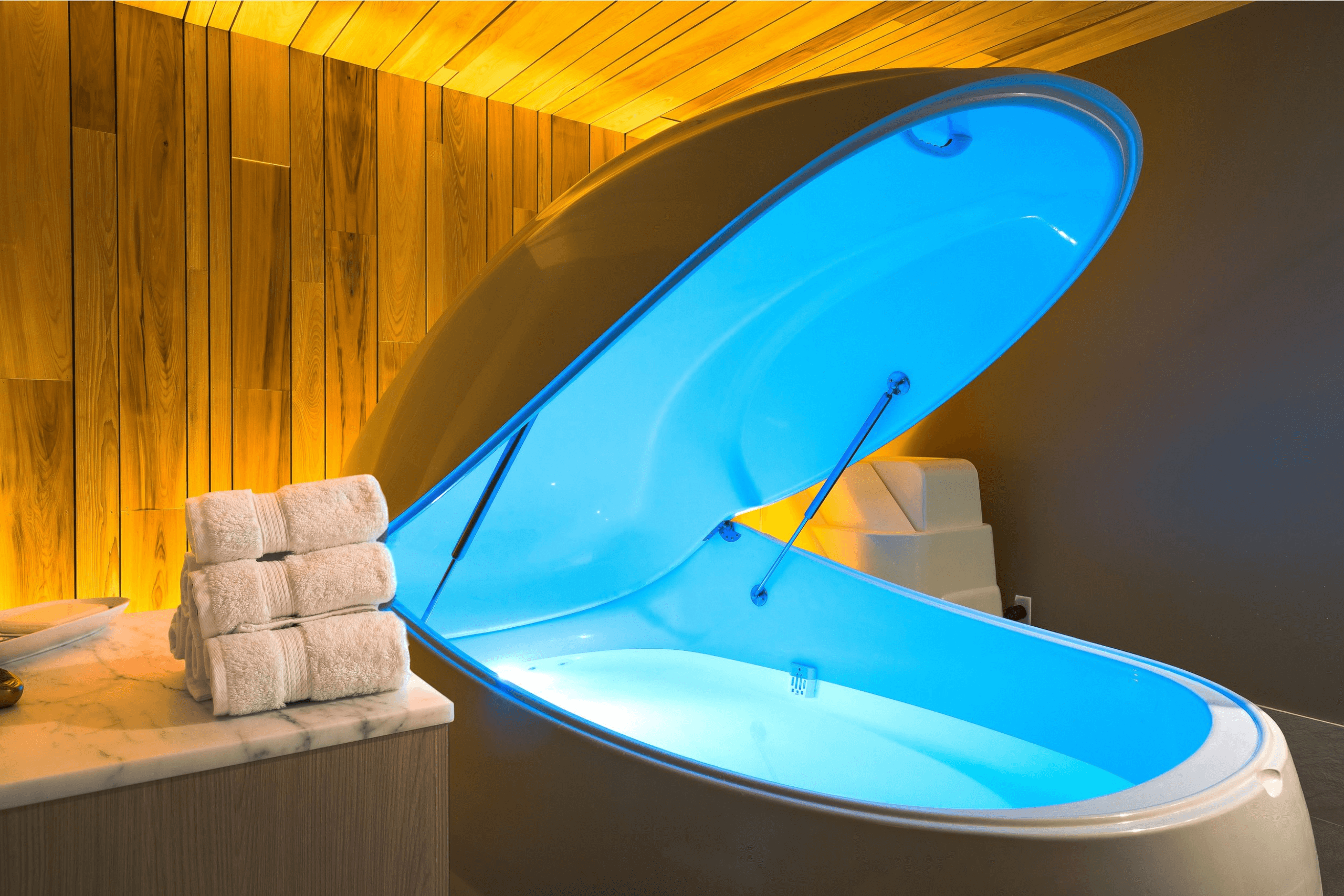In today’s busy world, many people struggle with stress and anxiety. Whether you’re running a business, managing a team, or simply trying to balance work and personal life, stress can quickly build up and affect your health. As more people search for ways to manage their stress, float therapy is becoming an increasingly popular option.
Float therapy, also known as sensory deprivation therapy, offers a relaxing experience by floating in a tank filled with warm water and Epsom salts. This simple method has proven to help reduce stress, ease anxiety, and promote mental clarity. In this blog, we’ll explore how float therapy sessions can help with stress and anxiety and why it’s becoming popular across the United States.
What is Float Therapy?
Float therapy involves floating in a tank that is dark and quiet, filled with warm water and a high amount of Epsom salts. This makes your body float easily, creating a feeling of weightlessness. The water is kept at skin temperature (around 93.5°F), so you don’t feel a temperature difference between your body and the water, which helps you relax even more.
Features of a Float Therapy Session:
- Sensory Deprivation: The tank blocks out light and sound, helping you disconnect from distractions.
- Epsom Salt: The high concentration of Epsom salt makes it easier to float and relax your muscles.
- Private Space: The float tank provides a peaceful and calm environment for you to relax.
- Float Tank Anxiety: This therapy can be especially helpful for people feeling overwhelmed by daily stress.
How Float Therapy Helps Reduce Stress
Stress is one of the most common causes of anxiety. It can affect both your mind and body, making it harder to focus and feel calm. Whether you’re juggling business tasks, managing teams, or handling tight deadlines, float therapy offers a much-needed break. Here’s how it helps:
1. Promotes Deep Relaxation
When you enter a float tank, your body quickly enters a relaxed state. The buoyancy created by the Epsom salts helps reduce muscle tension, allowing your body to unwind. The sensory deprivation environment also calms the mind by eliminating distractions, which helps reduce stress levels. As a result, floating reduces cortisol, the stress hormone, and leaves you feeling more at ease.
2. Eases Muscle Tension
Stress often leads to tight muscles and physical discomfort. The float tank allows you to relax fully, which eases muscle tension. The buoyancy in the water reduces the strain on muscles and joints, giving them a chance to recover. If you suffer from chronic pain or discomfort due to stress, float therapy can provide relief by taking the pressure off your body.
3. Improves Sleep
Stress can make it difficult to sleep well, leading to exhaustion. Float therapy helps your body and mind relax deeply, improving the quality of your sleep. By reducing muscle tension and calming the mind, floating helps you sleep better and wake up feeling refreshed and energized.
4. Boosts Mental Clarity
When stress takes over, it’s hard to focus or think clearly. Float therapy provides a break from mental distractions, allowing your mind to clear. The peaceful, distraction-free environment helps reset your brain, improving focus and clarity after just one session.
How Float Therapy Helps Reduce Anxiety
Anxiety can make everyday tasks feel overwhelming. It can cause constant worry, fear, and tension. While traditional treatments like therapy and medication are effective, many people are now turning to float therapy sessions as an additional way to manage anxiety. Here’s how it works:
1. Relaxation for Your Nervous System
When you float in the tank, your body enters a deep relaxation state. The absence of sensory input (sound and light) helps your nervous system calm down, lowering heart rates and reducing anxiety. The float therapy experience triggers the body’s natural relaxation response, helping you feel more in control.
2. Helps Process Emotions
The quiet, solitary space in the float tank allows you to focus on your thoughts and emotions without outside distractions. This is a great time to reflect on any worries or anxiety you may be feeling, helping you process emotions in a calm and controlled environment. For people who experience anxiety attacks, this time to reflect can provide relief and help you handle anxious feelings better.
3. Relieves Feelings of Overwhelm
Anxiety can make you feel overwhelmed by everything around you. The sensory deprivation float tank gives you a chance to step away from the noise and chaos of life, helping you find a sense of calm. Floating helps you manage overwhelming feelings by allowing your mind and body to reset, making it easier to approach challenging situations with a clear mind.
4. Supports Mindfulness
Mindfulness is a popular technique for managing anxiety, and float therapy enhances mindfulness practice. While floating, you can focus on your breath and the sensations in your body, helping you stay present and calm. This practice can significantly reduce anxiety and help you become more aware of your thoughts and emotions.
Who Can Benefit from Float Therapy?
Float therapy sessions are beneficial for a wide range of people, including:
- Business Owners and Managers: Managing a business can be stressful, and float therapy offers a way to relax and reset.
- E-Commerce and Marketing Professionals: The fast pace of online business can cause burnout. Floating helps relieve stress and improves focus.
- Local Business Owners in the U.S.: Business owners can benefit from clearer thinking, better sleep, and reduced stress.
- Anyone Struggling with Stress or Anxiety: No matter what your job or lifestyle is, float therapy can help you relax and find relief from stress and anxiety.
Conclusion
If you’re looking for an effective way to manage stress and anxiety, float therapy offers a peaceful and natural solution. It helps you relax, reduces muscle tension, and calms your mind, all of which contribute to improved well-being. Whether you’re a busy business owner, a marketing professional, or simply someone seeking relief from everyday pressures, float therapy sessions can help you feel more relaxed and focused.
At Secret Soak Society, we specialize in offering the best float therapy sessions guidance to help you relax and recharge. Whether you are new to floating or have tried it before, our peaceful environment and expert care will help you experience the full benefits of float therapy. Book your session today and discover how a sensory deprivation float tank can help you reduce stress and anxiety.
FAQs About Float Therapy
1. How long do float therapy sessions last?
Float sessions usually last between 60 and 90 minutes, though you can choose the duration based on your preferences.
2. Do I need to know how to float?
No, the sensory deprivation float tank is designed to support you as you float effortlessly. You don’t need any special skills or experience.
3. Is float therapy safe?
Yes, float therapy is generally safe for most people. If you have any health concerns, it’s a good idea to speak with a doctor before trying it.
4. What do I need to bring to a float therapy session?
Most float centers provide everything you need, including towels and shampoo. You can bring a swimsuit if you prefer, though many float centers offer private rooms where clothing is optional.
5. How soon can I feel results from float therapy?
Many people feel relaxed and less stressed right after a session. For long-term benefits, it’s helpful to float regularly.






